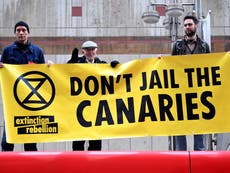British governments are making it cheaper to fly – and the environmental damage will be immense
The Scottish government is cutting air passenger taxes which will mean hundreds of thousands more flights a year. The truth is that we need to be making air travel more expensive, not less

After months of Brexit obsession, David Attenborough, Extinction Rebellion and Greta Thunberg’s youthful crew have drawn the nation’s attention back to the bigger issue of climate change.
Governments across the British Isles have been keen to act concerned about the climate. Yet in reality, they are overseeing a race to the bottom which is making the most environmentally damaging form of transport cheaper and cheaper.
The UK’s aviation sector is responsible for emitting 34 million tonnes of carbon dioxide a year. That’s more than the total annual emissions of Myanmar – a nation of 54 million people.
If you fly once from Edinburgh to Heathrow and back, you’re responsible for emitting more carbon dioxide than the average Ethiopian emits in a year.
Given the damage flying does, we should be raising its taxes to make it less attractive. In Europe, airline fuel is currently exempt from tax. That needs to change.
Yet instead, devolution and shortsighted nationalist competition has allowed a slashing of air passenger taxes among the nations of the British Isles.
It began in 2012 when Northern Ireland was given the power to set its own Air Passenger Duty (APD) rates on long-haul flights. The Northern Ireland executive set them to zero in 2013. The next year, the Republic of Ireland scrapped its own €3 per person air travel tax.
That same year, the Scottish independence referendum took place. Spooked by a surge in support for independence, David Cameron, Ed Milliband and Nick Clegg promised to grant more powers to the Scottish government if Scotland voted to remain in the UK.
They duly did so and Cameron set up the Smith Commission to look into what powers should be devolved to Scotland. One of them was the power to set air passenger taxes.
The SNP Scottish government used these powers to set up its own version of the UK’s APD called the Air Departure Tax. The SNP government, which trumpets itself as a climate leader, has promised to cut the tax by 50 per cent at first and then to scrap it altogether.
Thanks to opposition from Scottish Labour, Greens and Liberal Democrats and complications caused by European Union state aid rules, the government has not yet been able to cut the tax but it says it remains committed to doing so.
Inspired by the Scottish and Northern Irish examples, the Welsh government is now asking for the power to set air taxes. Westminster’s Committee on Welsh Affairs is currently having an inquiry into whether or not to grant their request.
And if the Welsh government cuts air taxes then airports like Bristol and Birmingham, which share catchment areas with Cardiff, will understandably want the same. If they get the tax cuts, then why not Manchester, Liverpool or Heathrow? How long before the tax is scrapped across the UK.
According to the airports themselves, less tax means more flights. That means more greenhouse gases. Research commissioned by Edinburgh airport estimates that a 50 per cent cut in Scottish air taxes would mean 900,000 more passengers a year passing through Scottish airports. The research didn’t calculate the environmental damage this would cause – but it would be substantial.
While we would all suffer the effects of tax cuts, most of us would barely feel the benefit. According to the Scottish Greens, most Scots do not fly at all in a given year. Those that do fly are largely on the richer end of the scale and those that fly a lot certainly are, with their tickets probably paid for by their employer anyway.
Some journeys are unavoidable, and nobody wants to make your hard-earned holiday more expensive than it has to be, but if we’re to get serious about stopping climate change and its associated floods, fires and rising sea levels then we need to cut down our collective air travel. It’s a small price to pay.





Join our commenting forum
Join thought-provoking conversations, follow other Independent readers and see their replies